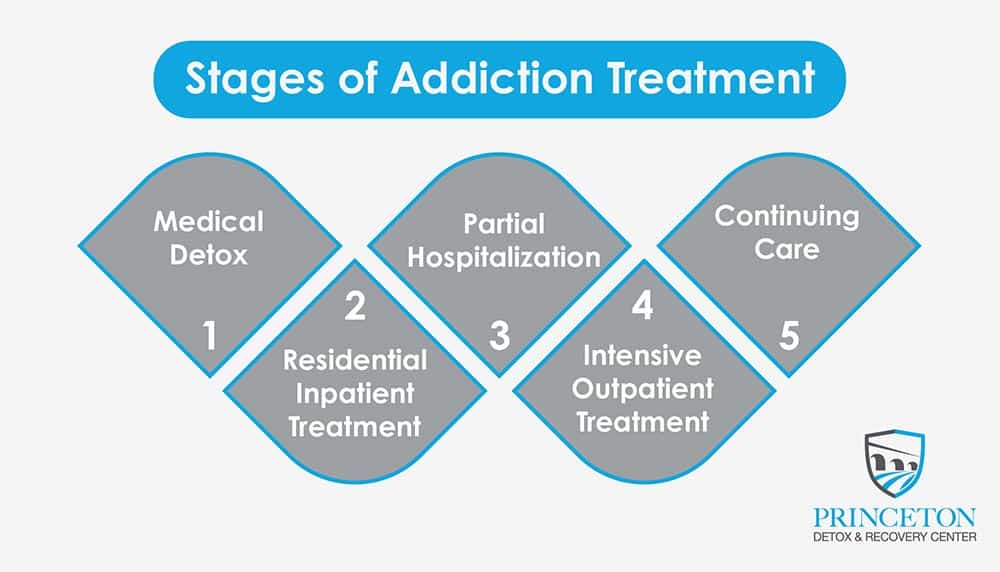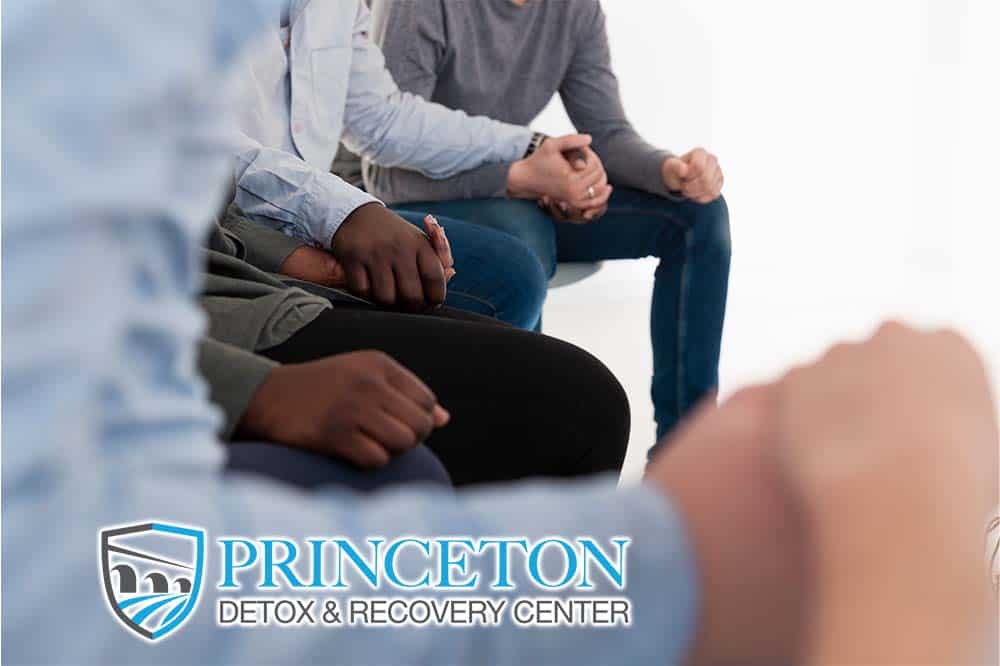Drug & Alcohol Detox
Morris County, New Jersey
If you or someone you love has been suffering from drug or alcohol addiction, entering into a medical detox program in Morris County is an important first step. The symptoms associated with drug and alcohol withdrawal are not only uncomfortable, they can be dangerous when left untreated. At Princeton Detox & Recovery Center we offer an individualized medical detox program for people of all ages in Morris County, New Jersey and all surrounding areas. We combine around-the-clock medical care with therapeutic intervention and proven holistic approaches. We focus on more than providing our clients with a safe and comfortable drug or alcohol withdrawal. We actively prepare them to take the next appropriate step on their personal journeys of addiction recovery. Contact us today to learn more about medical detox options in the Morris County area or to get started on the path to long-term sobriety.
What Is Medical Detox?
Medical detox refers to the process of undergoing drug or alcohol withdrawal in a medically supervised setting. Some people attempt to detox on their own, either because they believe they cannot afford to cover the cost of detox or because they believe they can successfully manage withdrawal symptoms on their own. As far as covering the cost of detox — most privately operated detox centers in Morris County, including Princeton Detox & Recovery Center, work with health insurance providers. If you are currently covered through a major regional provider in New Jersey or a major national provider, there is a good chance the services we offer will be covered partially or in full. As far as managing withdrawal symptoms without professional help — doing so is never a good idea, even if you think you know what to expect. The symptoms associated with drug and alcohol withdrawal can be unpredictable, and it is always a good idea to have a team of licensed medical professionals nearby in case complications do occur.
Medical detox typically lasts for between three days and one week, depending on the severity of your substance use disorder and the type of substance you were using. While you are in detox you will be physically stabilized. You will be given any medication that is deemed necessary, and you will undergo individual and group therapy if you are feeling up to doing so. Many detox centers offer additional treatment services like relapse prevention training, dual diagnosis treatment options, and case management. To learn more about how medical detox works and what you should expect from the process, contact us today.
Medical Detox Steps
What steps are involved in the medical detox process? The specifics will depend on several personal factors, including what type of substance you were using, for how long, and whether or not you are suffering from a co-occurring disorder. However, the steps associated with medical detox typically look like this:

- Make the decision to seek professional help for your substance use disorder.
- Reach out to a medical detox center in Morris County, New Jersey.
- Develop a plan of action (including local transportation, covering the cost of detox, and setting up a date and time for your admission).
- Once you arrive at the detox center in Morris County, you will undergo a detailed clinical and medical assessment, which will help the treatment team determine which detox methods are going to be the most beneficial for your unique case.
- Over the course of your stay you will be able to relax in your bedroom, socialize with other clients in common areas, and take advantage of the treatment services offered by the center (including 12 Step program involvement and therapeutic care).
- Your assigned case manager will work with you, your loved ones and the clinical team to develop a personalized aftercare plan.
- Once you have been deemed physically stabilized, you will transition into a higher level of care (inpatient treatment, partial hospitalization, or intensive outpatient treatment).
Contact us today with any additional questions about the steps involved in the medical detox process. We are happy to answer any additional questions you might have.
We Are Here For You
Let Us Help You Heal
Our Drug & Alcohol detoxification experience is second to none.
Learn how we can help by speaking with one of our Treatment Advisors today.
What is Inpatient Treatment?
The most common course of action is to enter into an inpatient treatment program in Morris County once medical detox concludes. Inpatient (or residential) treatment refers to a rehabilitation program that offers housing to its clients. As you undergo intensive therapy and learn how to avoid relapse, you will live among other sober individuals in a structured, substance-free setting. You will undergo immersive treatment 7 days a week, and you will take part in a carefully developed treatment program. The duration of your stay in inpatient treatment depends on several factors, including:

- The severity of your substance use disorder.
- Whether or not you have attended inpatient treatment in the past.
- The presence of any co-occurring mental illnesses.
- The severity of post-acute withdrawal symptoms.
- Your willingness/ability to enter into a program of continuing care.
In the majority of cases, residential inpatient treatment will last for between 30 and 90 days. Once you complete inpatient treatment you will traditionally move into a sober living home and continue with a lower level of clinical care, like partial hospitalization or intensive outpatient treatment.
Outpatient and Aftercare
Once you complete an extended stay in a residential inpatient treatment center, you will most likely transition into a sober house and continue with outpatient treatment. There are three main types of outpatient treatment: partial hospitalization (PHP), intensive outpatient treatment (IOP), and regular outpatient treatment (OP).
PHP provides the highest level of care, and while clients are still able to return home in the evenings they typically attend treatment for between 5 and 7 days a week. IOP is a step down from PHP, and offers more flexibility and personal freedom. Most IOP groups meet for between 3 and 5 days a week, either in the mornings or in the evenings depending on what works best with your schedule. If you work during the day, for example, a nighttime IOP group might be the best option. If you are attending night classes in pursuit of your GED, a morning IOP group might work best for you.
Finally, OP offers the most flexible level of outpatient treatment, with groups meeting no more than 3 days a week for several hours each day. It is recommended a person transitions into a sober home in Morris County, New Jersey as they continue with outpatient care. Sober living homes provide structure and accountability, and are a safe place to live while you navigate early sobriety and learn how to stand on your own two feet. While Princeton Detox & Recovery Center is not affiliated with any sober homes in Morris County, we are happy to provide a recommendation and help you find a living environment that is right for you.
Aftercare is a crucial part of the treatment process, and aftercare planning should begin during medical detox — the first stage of your recovery journey. At Princeton Detox & Recovery Center we offer personalized aftercare planning services to our clients, helping them develop a plan for continuing care that works for them. This often includes an immediate transition into inpatient treatment, PHP or IOP. Contact us to learn more about the treatment planning process.
Drug and Alcohol Abuse in Morris County
Morris County, the 10th most populous county in New Jersey, is located roughly 30 miles west of New York City. Morris County is made up of several individual cities, including Boonton Township, Butler, Chatham Borough, Chatham Township, Chester Borough, Chester Township, Denville, Dover, East Hanover, Florham Park, Hanover and Harding. Like the rest of New Jersey, Morris County has been particularly hard hit by the nationwide opioid epidemic. In March 2021 the Morris County Sheriff’s Office issued a warning on a surge of heroin-related overdose deaths in the area. The official statement reads, “New Jersey’s opiate epidemic has grown more complicated and deadly with the onset of the COVID-19 emergency. Recent overdoses are being fueled by a more potent form of fentanyl circulating in North Jersey. A synthetic opioid, fentanyl is 50 to 100 times more potent than morphine, and when mixed with heroin, it can create doses of unpredictable and often lethal strength.
Since the start of 2021 alone, Morris County has experienced 16 fatal opiate and 22 non-fatal opiate overdoses in Morris County. Victims are from such communities as Boonton, Denville, East Hanover, Lincoln Park, Jefferson, Morristown, Mt. Arlington, Parsippany, Pequannock, Riverdale and Roxbury, and have ranged in ages from 24 to 60.
In 2020, Morris County experienced 78 overdoses found to be opiate-related.
This is an epidemic that impacts every community, and can claim victims at all stages of life.” (1)
Heroin is not the only substance-related health threat faced by Morris County residents. Rates of alcohol use and dependence remain high, and other opioids — like prescription painkillers and fentanyl — are responsible for a significant number of drug-related overdose deaths annually. If you or someone you love is looking for addiction treatment options in Morris County, New Jersey, Princeton Detox & Recovery Center is available to help. Contact us today to learn more.
Morris County Drug and Alcohol Use Statistics
According to the 2019 Substance Abuse Overview for Morris County, both heroin use and alcohol use pose significant threats. Roughly 39 percent of all treatment centers admissions were related to heroin, and the exact same percentage of admissions were related to alcohol (1,203 and 1,195, respectively). New Jersey as a whole has been devastated by increasing rates of substance misuse and dependence. The New Jersey Drug and Alcohol Abuse Treatment 2019 Statewide Overview found that more treatment admissions for heroin than any other chemical substance (42 percent of total admissions). This number was closely followed by treatment admissions for alcohol (31 percent of total admissions). There were a total of 41,854 treatment admissions for heroin use disorders in 2019, and 30,651 admissions for alcohol use disorders. From 2018 to 2020, the state of New Jersey averaged 3,000 overdose deaths annually. As the opioid epidemic rages on in the east coast — and throughout the rest of the country — it is exceedingly important for New Jersey residents to have immediate access to effective addiction treatment services. At Princeton Detox & Recovery Center, accessibility, affordability and program effectiveness remain our top priorities.
Ready To Begin Your Detox?
Don’t let addiction control your life.
Call us today and let’s get you started on the path to a better you.
Why Princeton Detox & Recovery Center?
What sets Princeton Detox & Recovery Center apart from other medical detox centers in Morris County, New Jersey? Unlike detox programs offered by state-funded facilities or found in traditional lock-down hospital settings, we provide highly individualized care. Upon admission to our detox program each client undergoes a detailed addiction assessment. This assessment helps the treatment team determine which detox methods are going to be the most beneficial for each unique case, and assists case managers in the development of a personalized aftercare plan. The amenities we offer are also unique. Our detox center provides clients with a homestyle retreat setting; a combination of the comforts of home and around-the-clock medical care truly set our program apart. You are able to relax in your bedroom or socialize with other clients in our well-appointed common areas. We offer chef-prepared meals and a range of addiction treatment services, from individual therapy with a licensed therapeutic professional to dual diagnosis treatment options and holistic group workshops. Contact us today to learn more about our integrated and individualized detox program in Morris County.
How to Find the Best Rehab for You in Morris County
You have decided that your substance use issue has gotten out of hand, and professional help has become a necessity. How can you go about finding the best rehab program for you in Morris County, New Jersey? First, we recommend asking yourself several important questions that will help narrow down your search.
Ask yourself:
- Am I looking for a multi-phased curriculum of care that includes medical detox, inpatient treatment, and continuing care?
- Do I have an underlying mental illness that should be addressed in a dual diagnosis treatment center?
- Am I looking for a demographic-specific treatment center, such as one that offers a program specially designed for Executives or Professionals, or one that offers gender-specific treatment groups?
- Is it a good idea for me to stay local when looking for a treatment center, or should I consider traveling out-of-state for treatment?
- Is the rehab in Morris County both licensed and accredited through the state of New Jersey?
- Is the rehab staffed by a team of licensed and experienced professionals with ample hands-on experience in the substance use/addiction treatment field?
Get Help for Addiction in Morris County
What steps can you take to get help for addiction in Morris County, New Jersey? The most effective way to get the help you need is by reaching out to a trusted professional or addiction specialist. This might look like calling up a local detox center and asking for more information, setting up an appointment with a licensed therapist, or calling an emergency hotline in your area and requesting additional resources. At Princeton Detox & Recovery Center we are standing by to help and we are more than happy to answer any questions you have regarding the addiction treatment process. Even if our program is not a match, we will find you a program that works for you. As soon as you make the decision to reach out, you are well on your way to overcoming addiction and living a life of recovery.
Contact Us Today to Learn More
If you or someone you love has been suffering from a substance use disorder in Morris County, New Jersey, Princeton Detox & Recovery Center is available to help. As soon as you make the decision to reach out for help you will be put in touch with one of our knowledgeable and compassionate Treatment Advisors, who will walk you through our simple and straightforward admissions process. We begin by conducting a brief pre-assessment over the phone. The answers to the questions we ask help us determine whether or not our medical detox in Morris County is an ideal fit. If we believe our detox center is right for you, we will conduct a free, no obligation health insurance benefit check. If you are insured through a major regional or national health insurance provider, there is a good chance some or all of our detox services will be covered either partially or in full. Finally, we arrange local ground transportation to our Morris County detox center. The only thing standing between you and a life of fulfilling addiction recovery is a simple phone call. We look forward to hearing from you soon and helping you begin your own personal journey of addiction recovery.

Reviewed for accuracy by:
Amanda Hilzer M.Ed, CAADC, IADAC, ICCS, LCADC, CCS
Amanda graduated from Lehigh University with both an undergraduate degree in Psychology and a Master’s of Education degree in Counseling Psychology and has worked in the field of substance use disorder treatment and mental health treatment as a counselor and as a clinical manager for over 14 years.


































